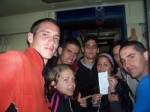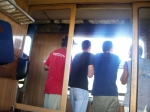 Early morning hours. Eight students from “Marta Abreu” Central University of Las Villas, passengers without tickets on a train. They are between cars, standing or crouching, shivering from the most intense cold in the world. In the door to the right, two cops: they don’t let them pass. At the door to the left, three railway officials: they have them surrounded. A man of enormous size and arrogance shouts from the station: the train will start only when those damn students who got on in Santa Clara without tickets get off. This happens at two in the morning in a place isolated even from itself: the town of Guayos, more than halfway to Camagüey, the destination of the boys.
Early morning hours. Eight students from “Marta Abreu” Central University of Las Villas, passengers without tickets on a train. They are between cars, standing or crouching, shivering from the most intense cold in the world. In the door to the right, two cops: they don’t let them pass. At the door to the left, three railway officials: they have them surrounded. A man of enormous size and arrogance shouts from the station: the train will start only when those damn students who got on in Santa Clara without tickets get off. This happens at two in the morning in a place isolated even from itself: the town of Guayos, more than halfway to Camagüey, the destination of the boys.
There are many other travelers who don’t have tickets, and they don’t bother them, then why harass the young people?
 Two months earlier, some of those same students boarded a train without tickets. That is normal in Cuba: the national railway doesn’t meet even twenty percent of passenger demand and there is a regulation that allows people who board without tickets to ride once they are on the train by paying double the established fare, to the delight of some industrious pockets. This system was applied to these boys, with the peculiarity that after having been squeezed (each one had to give a third of their monthly university stipend to stay aboard), they saw the money disappear into a pocket without getting any ticket or other proof of the transaction. So, it was the officials who got fatter.
Two months earlier, some of those same students boarded a train without tickets. That is normal in Cuba: the national railway doesn’t meet even twenty percent of passenger demand and there is a regulation that allows people who board without tickets to ride once they are on the train by paying double the established fare, to the delight of some industrious pockets. This system was applied to these boys, with the peculiarity that after having been squeezed (each one had to give a third of their monthly university stipend to stay aboard), they saw the money disappear into a pocket without getting any ticket or other proof of the transaction. So, it was the officials who got fatter.
 What did they do then? They wrote about it in a letter to the State newspaper Juventud Rebelde, the national escape valve of anyone disgusted who can’t deal with the primary causes, and that let to a purification process in certain instances on the Cuban Railways. There were sanctions against a couple of people. We return to Scene 1.
What did they do then? They wrote about it in a letter to the State newspaper Juventud Rebelde, the national escape valve of anyone disgusted who can’t deal with the primary causes, and that let to a purification process in certain instances on the Cuban Railways. There were sanctions against a couple of people. We return to Scene 1.
The little train boss, fired up by that event, in a Mafia-like revenge decided to take it out on the Santa Clara university students, until one night we, forced by inevitable lack of transport, got on the train. Far from the station, the character noted our unmistakable presence and ordered us to get off. Faithful police and functionaries pushed us from car to car until they had us all cornered. And there, with shouts, threats of fines and jail cells, they demanded that we get off the train at the first stop.
We decided this was discrimination and vengeance and abuse and they had no right and in the end we decided to remain still and silent. We didn’t want to get off in Placetas. A girl explained to the police the reasons for the disobedience. The train boss swore definitely to stop it in Guayos: “I’m going to call the Party and whomever.” Instinctively, we move closer. The police smoke nervously, without looking us in the eye. A civilian with the suspicious air of a negotiator wants to know what we want. To go to Camagüey and pay what we owe. The shrieks of the train boss, obstinate about telephoning the station, feeling it all on the dark platform. Some hesitated: What if they arrest us? What if they kick us out of the University? No one answered the one who had spoken: his girlfriend looked at him and spit her gum out the window.
Welcome to the land of El Mayor*, says the most visible sign on the Camagüey train station. With our bags over our shoulders, still smiling still scared, we separate that morning at the station. We look back, the stopped train, its masters incapacitated and its servants hideous, in the early morning when some young men lost their fear.
*Translator’s Note: El Mayor is the nickname of Ignacio Agramonte (1841-1873), a hero of Camagüey in the fight for independence from Spain.
September 15, 2010
